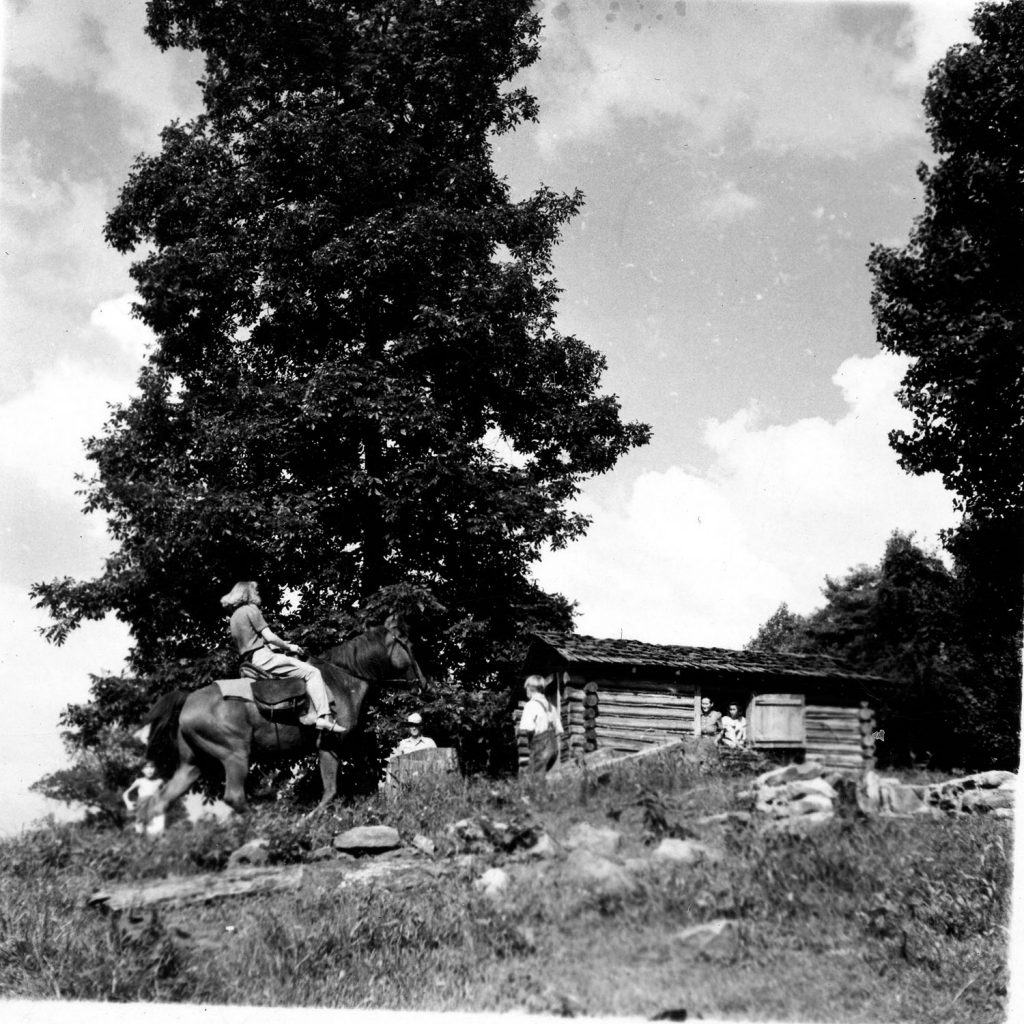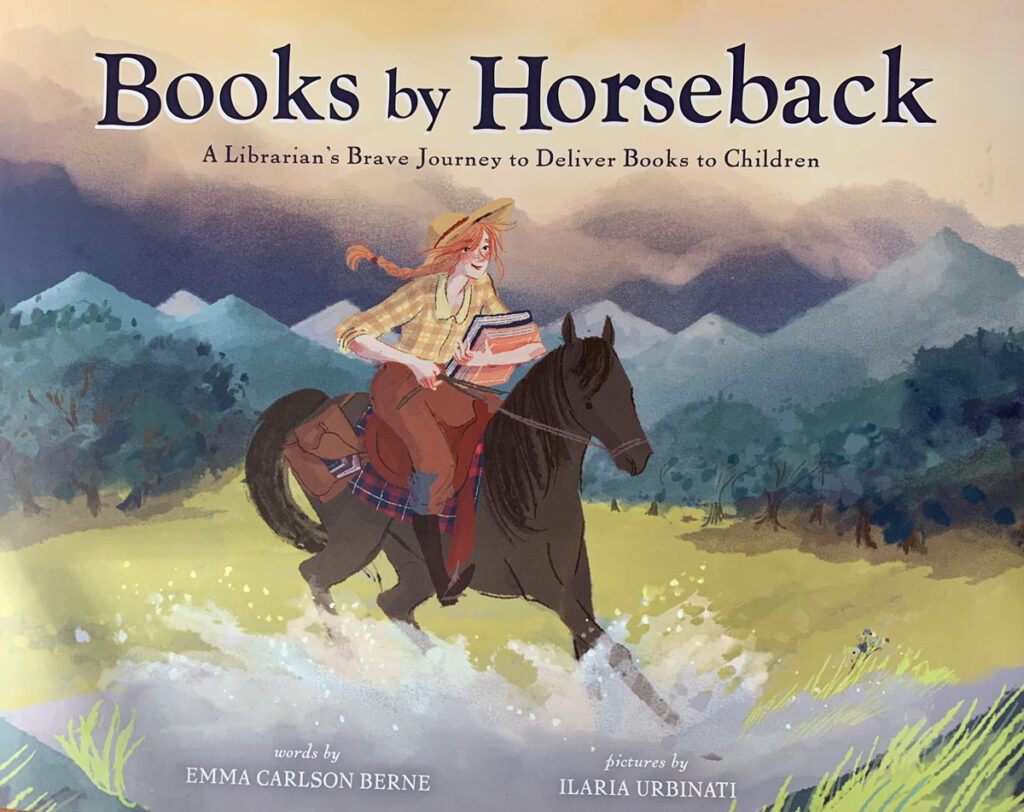Pine Mountain Settlement School
Series: DANCING IN THE CABBAGE PATCH
Books, Horses, and Place

BOOKS, HORSES, AND PLACE
In 1941 the Co-op Program was a well-tested and central part of the educational curriculum at Pine Mountain Settlement School. As an important part of the progressive curriculum, it was a community outreach program that included many aspects of the popular WPA librarians on horseback or packhorse librarians initiative.
In addition to bringing books and magazines to the surrounding Community, the Pine Mountain Settlement program also checked on the health and well-being of the families it served. Many of the visits were in countrysides so rugged that the only means of reaching the home was to travel along streambeds or over roadless mountains. Horses and mules were the only viable transportation. The visits of the Co-op students and often their staff monitors were eagerly anticipated in the homes and they opened the way for families to connect to the Pine Mountain Settlement School and for the School to expand its services.
While the program was conceived under the direction of Glyn Morris, the young Settlement School Director, it was not implemented until the mid-1930s and ended in 1949. While not unique in the many mountain programs of Librarians on Horsebackt, it touched the lives of many children and their families. While established for very pragmatic and often life support reasons, the idea of young women on horseback traveling through difficult mountain terrain, in the rain, sleet, and snow also had a romantic over-tone.
Perhaps it is the romantic notion of a young girl and her horse facing the world together that appealed. In older generations, the story of Black Beauty still lingers with romantic nostalgia. Perhaps it is the Kentucky horse ambiance. Whatever the inspiration, the stories surrounding the workers and “librarians” who participated in the packhorse program have, in recent years, begun to proliferate. The reasons for the recent uptick in interest in the WPA Librarians on Horseback are many. But, the message, one of service, sacrifice, selflessness, and literacy is important to any generation.
The many selfless hours spent doing community work by women while dependent on the courage and coordination of a horse has far more practical lessons than many contemporary children’s book themes. Further, getting lost in the imagination while on the pages of a book seems far more productive than the passive clicking on electronic media.

A new book has just been published by Little Bee Books, written by noted children’s author Emma Carlson Berne, and illustrated by Italian artist Ilaria Urbinati. It fires up the reader’s imagination. What is so very special about this delightful book is that it is written for and about rural children who are often more removed from libraries. The rural in this case is based on conversations with people from the Pine Mountain Settlement School and the valley is in one of the most remote areas of Eastern Kentucky.
The book quickly brings the reader into a very accessible tale of Edith, the young “Librarian” who sets off to deliver books while riding Dan, her trusted horse. As the story gallops along, it is sprinkled with local references such as pawpaw pudding, mountain springs, a fierce and unexpected thunderstorm, and even a familiar mountain family name, “Caudill.” The possible nod to Caudill is perhaps an oblique recognition of noted Appalachian children’s author, Rebecca Caudill, a winner of the National Young Reader’s Award and also a Newberry Honor Book in 1950. Caudill was a frequent visitor of the Pine Mountain Settlement
The second delight in Berne’s book are the beautiful illustrations by Italian artist Ilaria Urbinati. Ilaria, who lives in Turin on the northern mountainous edge of Italy, has captured the dual nature of mountain living with its beauty and its danger. Her images nearly gallop off the page with energy that competently matches the romping narrative. While Edith looks a bit like a modern Pippi Longstockings, the artist has captured the energy of horseback riding and of the fearlessness of so many Appalachian girls in their native mountains. The author and illustrator have both grasped many of the natural obstacles that the women on horseback often faced in delivering their “libraries.”
Edith, the librarian in this little book, as Berne explains in her Author’s Note, is not the typical urban librarian that families may know in their city and town settings. She’s a very special librarian, and one that historically existed in the mountains of Eastern Kentucky. Edith, like the other “librarians” that were often called “Packhorse Librarians” in the WPA (Works Progress Administration 1935-43) offering, was special. In the Appalachian region, young girls were often hired from the local community to fill the librarian role. They knew the mountains, the weather, the dangers that come with the rugged countryside, and the lives of the isolated families.
In her notes, Emma Berne places the story within the genre of WPA Packhorse Librarians in the Appalachians, but she makes the nature of the program locally intimate in her description of the mountain librarian, as well universal in the bravery of women generally. She describes how her local interviews and personal background helped her to shape her story. What she offers up is an inspiring and beautifully illustrated tale that will capture the imagination of young children of both genders, will enchant the parent reader, and bring the public into close contact with rural America.
Pine Mountain thanks Emma for her interest in the Settlement School and for the inclusion of interviews in the region while developing her book. This book is highly recommended for all libraries. While other reviewers have pointed out that the book is “White”, suggesting that it was purposeful in excluding people of color, they have most likely not traveled in the most remote regions of Appalachia. Yet, it is a book that gives dignity to all peoples, particularly rural America, and which is independent of race, ethnicity, and class.
HHW /AAE
SEE ALSO
RUTH SHULER DIETER Student
RUTH SHULER DIETER Photograph Album
EDUCATION Pack Horse Library Service at PMSS
SIDNEY ALBERT HELTON Student
CAUDILL Family

